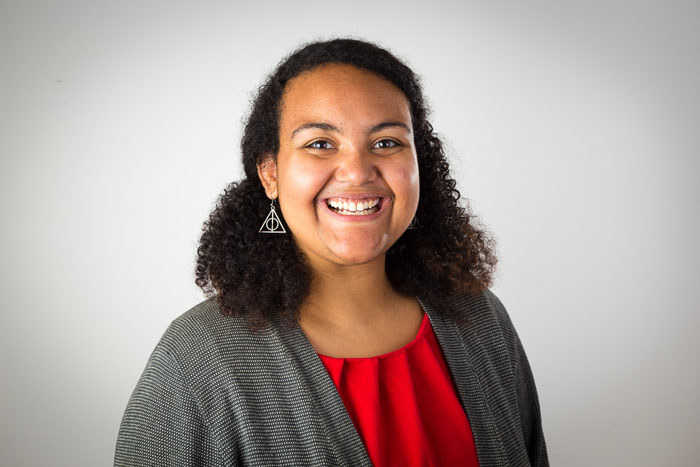Alum and Science Librarian Alexa Carter Focuses on Student Success
 Helping students find science resources comes naturally to Alexa Carter (’18). When she was an undergrad at the University of Tennessee, earning her degree in chemistry, she often found herself helping other students find information for lab classes. Her interest in chemistry merged with a love of the information sciences when she began looking for an elective to take.
Helping students find science resources comes naturally to Alexa Carter (’18). When she was an undergrad at the University of Tennessee, earning her degree in chemistry, she often found herself helping other students find information for lab classes. Her interest in chemistry merged with a love of the information sciences when she began looking for an elective to take.
“I had a friend who was doing information science, and she thought, with my curious nature, I might like it. So I took a class as an undergrad and kind of fell in love with it,” Carter said.
As her undergraduate experience started coming to a close, she began thinking about next steps. That elective information sciences course stuck with her, so she started looking at the master’s program at the UT School of Information Sciences. It just so happened that the school was looking for students to be in a User Experience Assessment program, and she was hooked.
“I don’t think I initially set out to be a librarian, but looking back at the different interests I had while doing my chemistry degree, it went way beyond the laboratory aspect and aligned well with scientific communication and information,” she said.
One of Carter’s favorite aspects of the MSIS program was the wide variety of opportunities it gave her to experience different aspects of information science professions before graduating. The UXA program allowed her to follow an academic libraries track and study research techniques in that area, but Carter also completed practicums with the US Geological Survey and Oak Ridge National Laboratory.
“[The practicums] were probably my favorite part, and one of the things that drew me to the SIS program at the UT were the unique experiences you could do within science organizations,” she said.
At the US Geological Society, Carter helped update the agency’s catalog and also explore what features scientists and researchers wanted the catalog to have. At the ORNL library, SIS alum Anna Galyon (’09) showed Carter what it is like to be a science librarian, both in the library and in the field.
“It was the perfect introductory experience to librarianship within the sciences,” Carter said.
After graduating with her MSIS, Carter entered into the North Carolina State University Libraries Fellows Program in Raleigh. She said it gave her an early career introduction to working as a science librarian in a larger institution producing a lot of research. That fellowship position turned into a full-time one as the Research Librarian for Physical Sciences and Graduate Services at NCSU Libraries. Carter said it’s been a great fit because she gets to work with students and continue her research.
“A lot of research I am focused on right now is diving into the graduate student success stories and exploring how – especially at my library but at other institutions – the library can be part of that journey,” she said.
Some of her other areas of focus at her job are training students on how to teach their peers, and how to talk about their science to different audiences. She does this by overseeing the Peer Scholars Program, which pays graduate and post-doctoral students to conduct workshops in the library.
“They’re able to get that teaching experience they may not otherwise be able to get, and they can teach their peers. It’s really cool to see how graduate students can benefit and strengthen their skills,” she said.
Carter is excited to see more science librarians being trained in the field, such as the new cohort of students in the University of Tennessee’s SIS Collaborative Analysis Liaison Librarians (CALL) program.
“As someone who has a science background, it’s really helped me to connect with researchers and it’s really exciting to see the [SIS] is doing something about that and allowing those who have that background to create a path based on those interests,” she said. “It only makes sense to have people who know and understand the technical aspects of sciences and I’m excited to see where those students end up going afterwards as well.”
While she is still very early in her career, Carter said she wants to see where her current position will take her. She enjoys communicating with scientists and researchers, and she wants to keep exploring how libraries can “create meaningful interactions with students.”